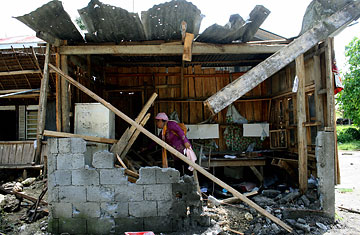
A resident returns to find her house damaged by mortar explosion on Aug. 14 in the southern Philippines
At around 8 a.m. on Aug. 17, a convoy of Philippines soldiers was traveling through Lanao del Sur, on the restive southern island of Mindanao, when, according to an army spokesmen, they were ambushed by Islamist insurgents. Four soldiers and four militiamen were killed. Before dawn the following morning, insurgents attacked two nearby towns, killing at least three more soldiers and 33 civilians. According to reports, the rebels hacked some of their victims to death with machetes. "They were killed as if like chickens," said a local army commander.
Since the 1960s, more than 120,000 people have been killed in the southern Philippines as Islamic separatists have battled government troops for control of parts of Mindanao. But this week's bloody events have pushed the region closer than ever to all-out war. On Aug. 20, the Philippine government ordered police commandos into the area with orders to kill insurgents. The government has also reportedly sent a shipment of weapons to local militias. General Alexander Yano, head of the country's armed forces, called the insurgent attacks a "virtual declaration of war," while President Gloria Macapagal Arroyo ordered government troops to defend "every inch" of territory.
Only a few weeks ago, the decades-long conflict between the government and separatist fighters seemed to be inching toward a political solution. On Aug. 4, negotiators for the Philippine government and the main insurgent group, the Moro Islamic Liberation Front (MILF), struck an agreement that would have set boundaries for an autonomous Muslim homeland, and, hopefully, dampened the insurgency. Yet, as has happened so often before in Mindanao, the center did not hold. After a challenge by Christian leaders in the minority-Muslim region who objected to the inclusion of some villages in the proposed Muslim area, the Philippines Supreme Court halted signing of the agreement.
According to Abhoud Syed Lingga, executive director of the Institute of Bangsamoro Studies in Mindanao and an expert on the conflict, the court's intervention set off a reaction among more radical MILF fighters. "When the Supreme Court interferes in an issue that is mainly political, it's a drawback," Lingga says. "It's a disincentive to insurgents to stop fighting and come back to the negotiating table."
Less than a week after the court's decision, MILF insurgents attacked 15 towns on Aug. 11 in Mindanao's North Cotabato province, killing at least nine people. Around 130,000 people were displaced by the North Cotabato violence, according the World Food Program, which is supplying refugees in the area. Fighting soon spread to neighboring areas, driven, says Lingga, by frustration with the political deadlock in peace negotiations.
In an Aug. 20 television interview, MILF chairman Al Haj Murad Ebrahim called on insurgents to end their attacks. But military spokesman Lt. Col. Ernesto Torres says the group may have lost control of its more radical military field commanders. "We consider these groups just plain criminals because they have defied the orders of MILF leadership," he says of the rogue insurgents. "We feel it's our responsibility to go after them and bring them to the bar of justice."
One local rebel leader in particular — known as Commander Bravo — has a reputation for defying MILF leadership to carry out daring, bloody military strikes. In 2003, during the last major flare-up of violence in the area, Bravo's soldiers robbed and murdered at least 16 civilians. In interviews, Bravo said he staged the attack in order to put pressure on the government to negotiate. In 2007, the insurgent leader threatened to attack government offices in the region after the MILF invited government personnel in to investigate the killing of 14 Philippine marines, 10 of whom were beheaded, allegedly by fighters affiliated with the al-Qaeda-linked terrorist group Abu Sayyef. "Bravo is known as one of those MILF commanders who is a bit more violent," Torres says. "Every time such issues have come up, they're the ones involved."
The MILF's apparent inability to rein in its local commanders could also seriously undercut any efforts to return to the negotiating table. On Aug. 21, President Arroyo announced that the government would no longer negotiate with armed rebel groups — a major departure from the policy of engagement that led to the Aug. 4 accord with the MILF. "These recent developments in the south have led to a change in the basic premise of our peace efforts," she said during a speech Thursday. "The focus of our talks shall shift from the armed groups to the communities."
But with recalcitrant insurgents like Commander Bravo determined to continue their armed struggle — and government police and soldiers deploying to meet them in battle — that could mean that the prospect of peace in the Philippines' violent south has slipped even further from reach.
